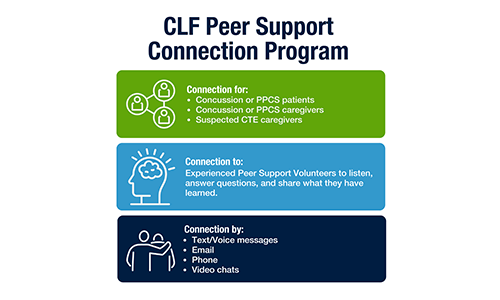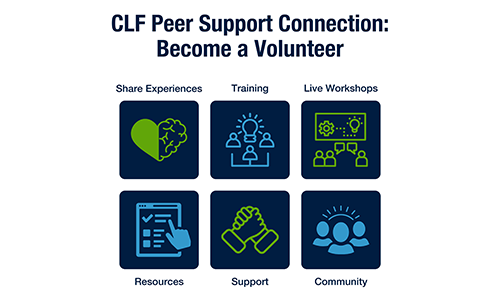Peer Support Volunteer Resource Hub
Thank you for being a Peer Support Volunteer with CLF’s Peer Support Connection Program! We’re grateful for your time and energy supporting patients and caregivers impacted by brain trauma.
This Peer Support Volunteer Resource Hub is intended for current volunteers. Please utilize the PSV Resource Hub including the training guidebook, recorded training sessions, booking links with CLF Peer Support Coordinators, and answers to frequently asked questions.
If you are not yet a volunteer but would like to discuss joining the CLF Peer Support Connection Program, please apply today to speak with our team.
If you are particularly interested in volunteering for patients navigating suspected CTE, click here to learn more.
Peer Support Volunteer Resources
Please be sure to read these documents when you become a volunteer and return to them as needed through the course of peer support connections.
- CLF Peer Support Volunteer Training Guidebook
- CLF Peer Support Volunteer Agreement
- CLF Crisis Response Resources
Have questions? Reach out to [email protected].

Peer Support Volunteer Videos
CLF’s team of Peer Support Coordinators offer training sessions and video resources for volunteers to get the most out of their peer support connections.
Visit our Peer Support Volunteer Resources Playlist for a comprehensive list of training videos, including the selected content below:

Frequently Asked Questions for Peer Support Volunteers
Have a question not answered below? Send us an email at [email protected].
Peer support involves building relationships between individuals with shared experiences. The intent of these relationships is to provide social and emotional benefits through genuine connection and empathy. Such relationships are be particularly important for individuals experiencing stress, trauma, or uncertainty.
The resources below offer additional information on core characteristics of successful peer support relationships and how peer support differs from other types of support, such as professional medical or mental health care:
When our team identifies a potential match, you will receive an email asking about your availability. Please respond to that email to let us know if you’re able to move forward with the connection.
Once you confirm your availability, CLF will introduce you to the Peer Support Partner by email to begin your connection.
If a Partner does not respond to a Volunteer intro email after two weeks, please notify CLF and we’ll message the Partner to check in. If they still aren’t responding or have not scheduled a first meeting after CLF checks in, we will work with the Volunteer to assess whether a path forward is possible.
Please note it can take several months for our team to identify a potential match. Feel free to send our team a message if you feel you’ve been waiting a long time for a connection.
Once you are connected with a Partner, you will take the lead on reaching out to schedule times to connect by phone, video call, text message, or email.
Please note in person meet-ups between Peer Support Partners are not allowed in the CLF Peer Support Connection program.
Over the course of your 12-month connection period, please take the lead on messaging your Partner along the following cadence:
- Month 1-3: Message every 2 weeks
- Month 4-6: Message once a month
- Month 7-12: Let Partners know they can message you every once in a while with questions or updates (typically once every 2-3 months)
If your Partner has stopped responding and doesn’t respond after two attempts to connect, let us know. We’ll check in with the Partner to see if additional steps are needed.
Connections are meant to last up to 12 months, with the first 6 months focused on active engagement with Partners.
We’ll message you and your Partner near the end of a connection period to check in.
You can choose whether or not to keep lines of communication open with your Partner based on your availability or needs.
In addition to 1-on-1 matches through CLF’s Peer Support Connection Program, CLF also offers Zoom support groups and Facebook forms. Feel free to share these resources with your Partners:
We offer monthly meetings via Zoom so Peer Support Volunteers can connect with each other, ask questions, and share experiences.
Please look for email invitations from [email protected] to register for a meeting.
When you start a new connection, or at any point during a connection period, please talk with your Partner about your preference to connect over phone, text, video call, or email.
Please note in person meet-ups between Peer Support Volunteers and Partners are not allowed in Peer Support Connection program.
If you feel you ever need to set boundaries with a Partner, please know the CLF team is here to support you. The Peer Support Volunteer Agreement and the Peer Support Partner Agreement outline guidelines which help support setting boundaries such as frequency of contact or methods of contact.
Yes! Good eye.
CLF’s 1-on-1 connections fall under the Peer Support Connection Program. Volunteers (you) are referred to as Peer Support Volunteers (PSV) or simply Volunteers. Patient and caregiver participants in the program are referred to as Peer Support Partners, or simply Partners.
Before October 2023, it was referred to as the CLF Mentorship Program and patient and caregiver participants were referred to as Mentees. The name was changed to more accurately represent the purpose and benefits of 1-on-1 connections.
PSV Resource by Category
The resources below offer supplements to the Peer Support Volunteer Training Guidebook linked above under Peer Support Volunteer Resources.
This section is intended for Peer Support Volunteers who indicated during onboarding that they are interested and eligible to connect with suspected CTE patients.
1-on-1 Peer Support Connections between suspected CTE patients and volunteers are rewarding, but can be particularly challenging. The symptoms of suspected CTE create unique obstacles which mean volunteers must be especially knowledgeable, committed, and healthy enough to take on the scheduling and communication responsibilities that come with a CLF Peer Support Connection. While it is important for suspected CTE patients to connect with volunteers who understand what they are going through on a personal level, it is equally important that volunteers who have a history of exposure to repeat head impacts (RHI) understand the symptoms of suspected CTE and assess whether they may be experiencing symptoms themselves. Volunteers must feel confident their own cognitive and mental health is strong in order to take on the role.
Patients may be matched with a CTE Non-Patient Volunteer, meaning a volunteer who has deep knowledge of suspected CTE, personal experience, and strong brain health, or a CTE Caregiver Volunteer depending on the circumstances.
If you are a Peer Support Volunteer matched with a suspected CTE patient, please ensure you have command of the following resources and tips for success:
- CTE 101
- CTE Knowledge Quiz
- Take CLF’s short CTE Knowledge Quiz with detailed explanations to identify topics for further exploration.
- Caregiver Guidebooks
- Setting Boundaries
- Boundaries and the intended scope of relationships are covered in the Peer Support Volunteer Training Guidebook linked above under Peer Support Volunteer Resources
- Getting Support from CLF
- If a relationship is difficult and you don’t know what to do, email CLF at [email protected]
- Navigating Possible Crisis Situations
- The most important first step is to email CLF at [email protected]
- Identifying possible crisis situations and knowing what to do if you suspect a partner is in danger is covered in the Peer Support Volunteer Training Guidebook linked above under Peer Support Volunteer Resources
- For a deeper understanding of CLF’s crisis response procedures, see the Peer Support Volunteer Crisis Resources document linked above under Peer Support Volunteer Resources
- Watch: Helping Concussion and Suspected CTE Patients in Crisis
These videos and worksheets offer helpful skills, tips, and tricks for you to employ during peer support connections:
Videos
- Active Listening Part 2
- Active Listening Part 1
- Helping Partners See a Path Forward
- Trauma Informed Care
- Fun Ideas for Peer Support Connections
- Peer Support Volunteer Self Care
- Helping Partners Cultivate Hope
- Helping Partners Communicate their Needs
- Helping Concussion & Suspected CTE Patients in Crisis
Worksheets
PSV Self-Care
- Peer Support Volunteer Self-Care
- How Meditation Can Help Post-Concussion Syndrome Recovery (please apply the content of this video to your needs as a PSV)
- Self-Care Assessment Worksheet
For personalized recommendations or professional mental health counseling options, please reach out to our team ([email protected]) or the CLF HelpLine.
Volunteer Period & Individual Connection Timelines
- Please refer to the Peer Support Volunteer Agreement for an overview of the PSV Commitment Period & a typical timeline for individual connections
How to be a Good PSV
- Please refer to the Peer Support Volunteer Training Guidebook linked above under Peer Support Volunteer Resources for tips and tricks
The CLF website has a wealth of information to support your understanding of the short and long-term impacts of brain trauma:
If you feel a Partner needs additional resources based on your conversations, please always notify our team at [email protected]. In many cases, your Partner will already have an open or ongoing case with our CLF HelpLine team. When you notify CLF, please share why you think your Partner may need additional resources such as medical or mental health provider recommendations, information about symptoms or treatment options, or urgent resources to help them navigate a crisis.
You are free to share the resources below with your Partner, but please understand the role of a Peer Support Volunteer is to provide interpersonal support by being a good listener and sharing relevant personal experiences. CLF is here to support with resource facilitation or addressing urgent needs.
Concussion
- Concussion Support & Resources
- Concussion Game Plan Podcast
- CDC HEADS UP Impact of Concussion on Mental Health in Children
Persistent post-concussion symptoms (PPCS) aka Post-Concussion Syndrome (PCS)
- PCS Support & Resources
- Caregiving for PCS
- Concussion Guidebook for Patients and Caregivers
- Post-Concussion Caregiver Guidebook (Canada)
Chronic Traumatic Encephalopathy (CTE)